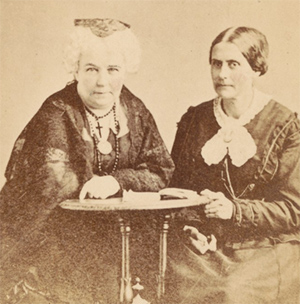
Cornell’s Rare and Manuscript Collections offer a deep assortment of materials on the study of the history of the Americas. Documents relating to the colonial and revolutionary war periods in North America include the papers of the Marquis de Lafayette, George Hyde Clarke, and the signers of the Declaration of Independence, along with diaries, muster rolls, and regimental histories.Materials on the 19th century include holdings on Harriet Beecher Stowe and Lydia Maria Child, and collections on reform movements such as temperance and woman’s suffrage. American political campaign history can be explored through Cornell’s Political Campaign Memorabilia Collections, which contain buttons, posters, textiles, and other artifacts from campaigns dating back to 1828. The fight to abolish slavery is documented through the Samuel J. May anti-slavery collection, along side other items on the Civil War era, including manuscript copies of the Emancipation Proclamation and 13th Amendment and one of five copies of the Gettysburg Address handwritten by Abraham Lincoln in 1864.
A regional history collection, begun in 1942, offers detailed documentation of everyday life in upstate New York through photographs, correspondence, oral histories and family papers. The Cornell University Archives, established in 1951, include university administrative records as well as personal papers of faculty members, students, administrators, and alumni, beginning with the papers of Cornell University founder Ezra Cornell, and Cornell presidents Andrew Dickson White, Jacob Gould Schurman and alumnus Willard D. Straight document diplomatic service in Germany, Russia, China, and the Philippines. The archives also contain more than 100,000 photographs that provide a comprehensive portrait of university life.
The collections are also strong in the documentation on the history of indigenous peoples of the Western hemisphere. Thousands of rare books document life-ways of the people of North, South and Central America, and manuscript materials provide documentation of the work of anthropologists and organizations relating to the study of and advocacy for indigenous people. A centerpiece of Cornell’s collections on this topic is the Huntington Free Library Native American Collection, an important gathering of more than 40,000 volumes and archival collections on the archaeology, ethnology and history of the native peoples of the Americas from the colonial period to the present.
African American history and culture is also an area of subject focus. Materials on the history of slavery are collected in the Rudin Collection on Slavery, photographic portraits and images African American life are available in the Loewentheil Collection of African American photographs. The history of Black thought and achievement is available through thousands of rare books, newspapers, and archival collections, and the Cornell Hip Hp Collection documents African American contributions to music, dance, and art.
Extensive collections on the history of gender and sexuality are available in The Human Sexuality Collection. Established in 1988 with a broad mandate to record and preserve the cultural and political contexts of sexuality, it was one of the first university collections of its kind. Particular attention is given to the history of LGBTQ lives. Among the holdings are personal papers, historical records, and publications by relating to gays and lesbians; erotic fiction; and records of AIDS activism and the personal papers of people with AIDS.